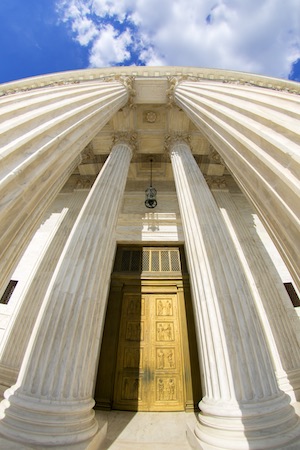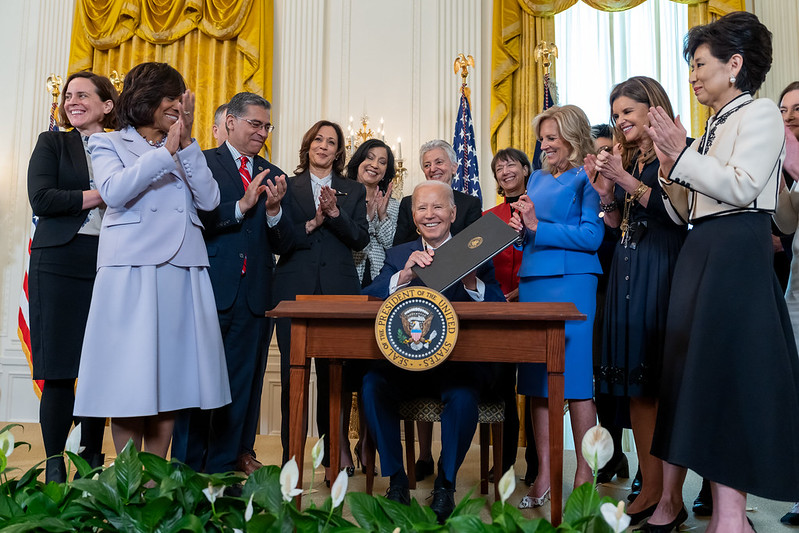Supreme Court Grants Real Estate Company’s Trademark Petition Challenging Profits Award Based on Affiliates’ Earnings
“The petition argues that the controlling rule of equity here is that a defendant cannot be ordered to disgorge a separate party’s profits.”
On Monday, June 24, the U.S. Supreme Court granted the petition for writ of certiorari filed in Dewberry Group, Inc. v. Dewberry Engineers Inc., taking up an appeal of a profits disgorgement award affirmed by a panel majority in the U.S. Court of Appeals for the Fourth Circuit. The petition from Dewberry Group challenges the Fourth Circuit’s endorsement of an expansive disgorgement remedy that reached into profits earned by affiliates of the petitioner, who were not included as defendants in the case, without any regard to principles of corporate veil piercing.
Ninth and Eleventh Circuit Rulings Required Veil Piercing Before Disgorging Profits
This appeal arises from a longstanding trademark dispute between a pair of commercial real estate development companies servicing areas of the southeastern United States. Following a 2007 settlement agreement allowing Dewberry Group (“Group”) to use the “Dewberry” mark in limited circumstances, a 2017 rebrand by Group led to a trademark infringement suit from Dewberry Engineers (“Engineers”) resulting in a $43 million profits disgorgement award against Group for profits by its affiliates, which weren’t parties in the case. Despite acknowledging that Group itself earned no profits from the alleged infringement, the Fourth Circuit affirmed the award over a dissent from Circuit Judge A. Marvin Quattlebaum, who noted that 15 U.S.C. § 1117(a) only speaks of the infringer’s profits despite the statute’s reference to “principles of equity.”
By ordering the disgorgement of profits from non-party affiliates without proper respect for corporate separateness, Group argues that the Fourth Circuit has created a circuit split that conflicts both with Supreme Court precedent and the plain text of the Lanham Act. The Lanham Act authorizes awards of only the defendant’s profits under Section 1117(a), and Group argues that the Fourth Circuit’s ruling will lead to forum shopping among parties seeking more expansive awards than are available in other circuits.
Group’s petition cites rulings from both the Ninth Circuit and the Eleventh Circuit as support for requiring plaintiffs to prove that the corporate veil must be pierced to collect damages for infringement by related entities. In U-Haul International v. Jartran (1986), the Ninth Circuit reversed a $6 million profits disgorgement award entered against the majority owner of a moving-truck company engaged in an advertising campaign that infringed upon U-Haul’s trademarks. The appellate court found that the owner did not use his corporate separateness from Jartran for fraudulent purposes, providing no basis to pierce the corporate veil.
Similarly, the Eleventh Circuit in Edmonson v. Velvet Lifestyles (2022) reversed a district court’s profits award entered against affiliates of a Miami-area nightclub, including the president and manager of the entity operating the nightclub. The appellate court in that case found that there was no direct liability to support the disgorgement award against the affiliates as the infringing marketing materials were created and used by only the entity operating the nightclub. The plaintiff raised no argument in the lower court that the corporate veil should be pierced, which led the Eleventh Circuit to rule that the affiliate parties must be treated as separate entities under the Lanham Act.
Lanham Act Language Doesn’t Reach Beyond Defendant’s Profits
Group’s petition argues that the Fourth Circuit’s reliance on the disgorgement award entered by the Fifth Circuit in American Rice v. Producers Rice Mill (2008) is misplaced because of differing facts in that case. While the Fifth Circuit ordered the district court to enter a larger disgorgement award of $1.2 million based on profits attributable to members of a farming collective that sold rice in bags bearing infringing marks, it did so after finding that the farming collective had earned those profits before passing them off to members.
In assessing Supreme Court precedent on corporate veil piercing, Group argues that such case law establishes the principle that a corporate defendant is typically not liable for the acts of affiliates. In United States v. Bestfoods (1998), decided in the context of the Comprehensive Environmental Response, Compensation, and Liability Act (CERCLA), the Supreme Court held that nothing in the statute excused the plaintiff’s from making a showing that veil-piercing applied in order to hold a corporation liable for the acts of its subsidiaries. Tracing the categories of recovery allowed under the Lanham Act, Group’s petition argues that none of these categories reach beyond the defendant’s profits, the plaintiff’s damages, or the costs of the action.
While the Fourth Circuit relied on Section 1117(a)’s reference to the “principles of equity,” Group argues that the controlling rule of equity here is that a defendant cannot be ordered to disgorge a separate party’s profits. Further, the petition says that the Fourth Circuit’s disgorgement award cuts against language from Section 1117(a) establishing that disgorgement “shall constitute compensation and not a penalty.” Because Group earned zero profits from the alleged infringement, it argues that this appeal presents an ideal vehicle to answer the question presented without the need to apportion profits attributable to infringement.
“The case has significant implications for related but legally distinct entities, such as those held by a single individual or a holding company, and particularly where those entities may provide services to one another,” said Evan Everist of Dorsey & Whitney. “If upheld, isolating risk and liability for infringement to a single entity in a corporate structure with multiple affiliated entities will likely prove more difficult.”
Rights acquired by AdobeStock
Steve Brachmann
Steve Brachmann is a graduate of the University at Buffalo School of Law, having earned his Juris Doctor in May 2022 and served as the President of the Intellectual Property […see more]







